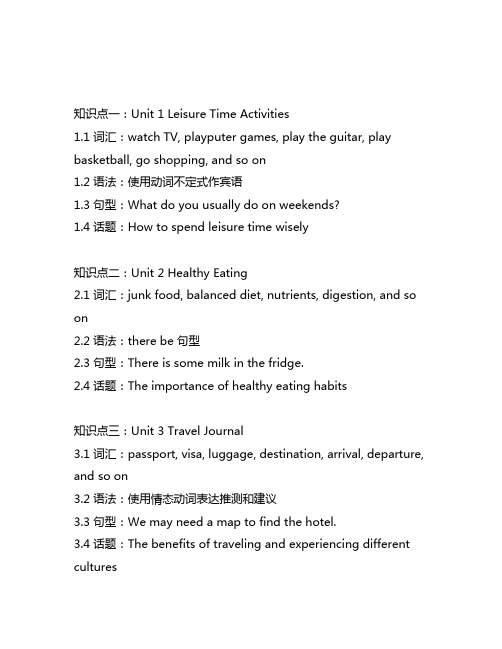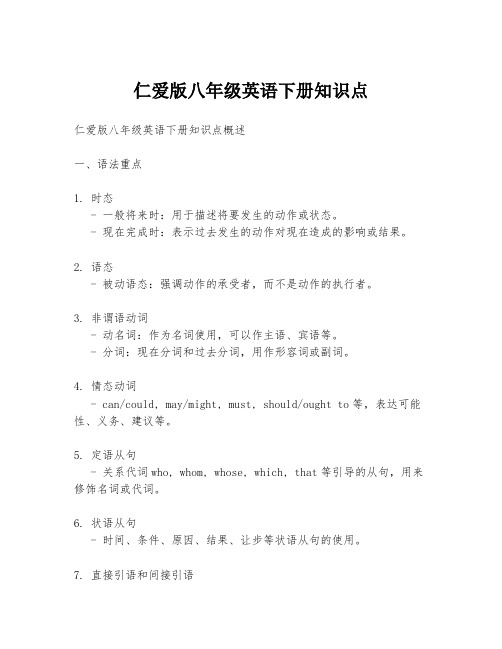(2019)仁爱英语八年级下册知识点归纳
英语八年下册知识点总结仁爱版(汇总8篇)

英语八年下册知识点总结仁爱版(汇总8篇)英语八年下册知识点总结仁爱版(1)【重点词组】seven-day holiday三天的假期on a visit to 去某地参观(not) to do 决定(不)做某事decide on 决定某事make a decision 做一个决定best way to do 做某事最好的方式the phone 通过电话the train tickets预订火车票hard/soft sleeper 硬/软卧money 筹集钱(借入) from 从某人那借某物lend(借出) to 把某物借给某人forward to doing 期望做某事from=get a letter from sb=receive a letter from 收到某人的来信the first day of在……第一天the top of 在……顶部cost 总花费的用法:① spend some time/money (in) doing on② pay some money for③It takes some time/money to do④ cost some moneyplaces= places of interest名胜古迹out/off 出发in trouble 有麻烦,处于困境【词形转换】安慰,抚慰安慰舒服comfortable 舒服的,安逸的加拿大Canadian 加拿大的,加拿大人的加拿大人正确的,恰当的properly 适当地。
正确地困难的difficulty [U]困难[C]各种困难【重点句型】have some exciting news to tell我有一些激动人心的消息要告诉你们。
will take us a few days to get there by骑自行车去那会花费我们几天时间。
’ d like to book some tickets to Mount我想预定一些四月十三日去泰山的票。
仁爱版八年级英语下册必考知识点归纳完整版

仁爱版八年级英语下册必考知识点归纳完整版不强调偏、难、怪,而着力选择学生最容易混淆,最容易出错的知识点和考点。
充分发挥课堂的系统性、直观性功能,将语法知识进行系统化的总结和讲解,把一些平时回避或者说不清楚的问题说得透彻清楚,使学生不仅能够记忆并运用各语法知识,更能形成一定的语法思维逻辑,灵活的掌握和理解语法,而不至于死记硬背。
详尽列举和分析解题技巧,使学到的语法知识活起来。
成绩快速上升sixty-eighty分。
Unit 5 Topic 1一. 重点词汇:(一)反义词happy----unhappy/sad lucky----unlucky poor----rich kind----cruel popular----unpopular smart----stu pid/ silly interesting----boring(二)表示情感的形容词excited感到兴奋的surprised 吃惊的happy 快乐的unhappy/ sad 伤心的angry / mad 生气的worried 焦急的afraid/ frightened 害怕的disappointed 失望的proud 自豪的lonely 孤单的nervous 紧张不安的interested 感到有趣的(三)重点词组1. one of my favorite movies 我最喜欢的电影之一2. spend the evening 过夜3. say thanks / goodbye/ hello to sb. 向某人道谢/道别/问好4. tell a short story 讲一个小故事5. a ticket to…一张…的票6. wish to do sth. 希望做某事7. get enough sleep 得到足够的睡眠8. win a medal 获得一枚奖牌9. feel proud/ lonely 感到自豪/孤单10. set a table for…为……摆餐具11. have a temperature = have a fever 发烧12. be able to do sth. 有能力做某事13. ring up 给……打电话14. care for= look after/ take care of 照顾15. because of 由于16. cheer up / cheer on 使……振奋、高兴起来/ 为……喝彩、加油17. play the role of sb. 扮演某人的角色18. be on 上演; 放映19. at first 首先20. fall into 落入21. be afraid of doing sth. 害怕做某事22. in/at the end = at last 最后23. go mad 发疯24. come into being 形成25. be full of 充满…26. be popular with…受……喜爱27. make peace 制造和平28. end/begin with…以……结尾/开始二. 重点句型及重点语言点1. How nice! 真是太好了!What a shame! 真可惜! =That’s too bad!What bad news! 多糟的消息!这三句全都是感叹句.它们的结构为:1) How + adj./ adv. + 主语+ 谓语! 如: How moving the movie is! How fast the boy runs!2) What + a/an + adj. + n. (可数名词的单数) + 主语+ 谓语! 如: What a big apple (it is)!3) What + adj. + n.(可数名词的复数或不可数名词) + 主语+ 谓语! 如:What interesting stories (they are)! What hard work( it is)!2. B ecause he can’t get a ticket to The Sound of Music. 因为他没有买到《音乐之声》的票.to 表“的”,常见的搭配如下:a ticket to The Sound of Music 一张《音乐之声》的票the answer to the question 问题的答案the key to the door 门的钥匙the way to…去…..的路3. I think Mr. Lee likes it very much and really wishes to watch it. 我认为李老师非常喜欢它而且的确想去看. wish/ hope to do sth.希望做某事与wish 相关的结构还有: wish/ hope + that引导的从句; 如:I wish/ hope (that) we will win.我们可以说wish sb. to do sth. 而不能说hope sb. to do sth.;4. I’ll ring up Michael later. 稍后我打电话给迈克.ring up sb. = call/ ring/ phone sb. = give sb. a ring/ call/ telephone = make a telephone to sb.当宾语为代词时, 只能放中间.如: ring me/him/her up5.…since they were not able to go. ……既然他们不能去.can与be able to 二者都表“能;会”,在指“一般能力”时,常互换。
八下英语仁爱版知识点总结

八下英语仁爱版知识点总结Unit 1: Getting to Know Each Other.Greetings and Introductions: Hello, goodbye, nice to meet you, my name is..., what's your name?, where are you from?, I'm from..., how are you?, I'm fine, thank you.Personal Information: name, age, birthday, address, phone number, email address, nationality, favorite color, favorite food, favorite subject, hobbies.Making Friends: asking questions to get to know someone, finding common interests, being friendly and approachable.Unit 2: My Family and Friends.Family Members: father, mother, brother, sister, grandparents, aunts, uncles, cousins.Describing Family Members: age, appearance, personality,occupation, hobbies.Friends: best friends, close friends, classmates, neighbors, online friends.Describing Friends: appearance, personality, interests, how you met them.Unit 3: My School Life.School Subjects: English, math, science, history, geography, music, art, physical education.School Activities: attending classes, taking notes, doing homework, studying for tests, participating in extracurricular activities.School Rules and Regulations: uniforms, attendance, behavior, discipline.School Events: school trips, sports events, cultural performances, graduation ceremonies.Unit 4: Where I Live.Types of Houses: houses, apartments, villas, bungalows, mansions.Parts of a House: living room, kitchen, bedroom, bathroom, garden.Describing a House: size, location, number of rooms, amenities, appearance.Neighborhood: neighbors, local businesses, parks, schools, hospitals.Unit 5: Daily Life.Daily Routine: waking up, getting dressed, eating breakfast, going to school, doing homework, playing, watching TV, going to bed.Food and Drinks: breakfast, lunch, dinner, snacks,fruits, vegetables, meat, fish, drinks.Clothing: types of clothes, colors, patterns, sizes, styles.Unit 6: My Town or City.Landmarks: famous buildings, monuments, statues, bridges.Public Places: parks, squares, museums, libraries, shopping malls, hospitals.Transportation: buses, trains, cars, taxis, bicycles.People and Culture: local customs, traditions, festivals, food.Unit 7: Travel and Adventure.Travel Destinations: countries, cities, tourist attractions.Travel Activities: sightseeing, shopping, dining, hiking, swimming.Transportation: planes, trains, buses, cars.Travel Tips: packing, getting around, staying safe.Unit 8: The Natural World.Animals: mammals, birds, fish, reptiles, amphibians.Plants: flowers, trees, shrubs, fruits, vegetables.Natural Resources: water, forests, minerals, oil, gas.Environmental Issues: pollution, climate change, deforestation.Unit 9: Science and Technology.Inventions: telephone, computer, microscope, television,airplane.Scientists: Albert Einstein, Marie Curie, Isaac Newton, Charles Darwin.Scientific Experiments: conducting experiments, collecting data, analyzing results.Technological Advancements: smart phones, laptops, tablets, artificial intelligence.Unit 10: The World Around Us.Countries of the World: continents, countries, capitals.Cultures of the World: languages, religions, traditions, customs.Global Issues: poverty, hunger, war, climate change.International Cooperation: United Nations, Red Cross, Doctors Without Borders.。
英语仁爱版八年级下册知识点总结

知识点一:Unit 1 Leisure Time Activities1.1 词汇:watch TV, playputer games, play the guitar, play basketball, go shopping, and so on1.2 语法:使用动词不定式作宾语1.3 句型:What do you usually do on weekends?1.4 话题:How to spend leisure time wisely知识点二:Unit 2 Healthy Eating2.1 词汇:junk food, balanced diet, nutrients, digestion, and so on2.2 语法:there be 句型2.3 句型:There is some milk in the fridge.2.4 话题:The importance of healthy eating habits知识点三:Unit 3 Travel Journal3.1 词汇:passport, visa, luggage, destination, arrival, departure, and so on3.2 语法:使用情态动词表达推测和建议3.3 句型:We may need a map to find the hotel.3.4 话题:The benefits of traveling and experiencing different cultures知识点四:Unit 4 Making the News4.1 词汇:reporter, headline, journalist, article, interview, and so on4.2 语法:使用虚拟语气表示假设4.3 句型:If I were you, I would follow the latest news.4.4 话题:The role of media in shaping public opinion——《英语仁爱版八年级下册知识点总结》1. 介绍英语作为一门国际通用语言,对于提高个人综合素质和竞争力具有重要意义。
仁爱版八年级英语下册知识点

仁爱版八年级英语下册知识点仁爱版八年级英语下册知识点概述一、语法重点1. 时态- 一般将来时:用于描述将要发生的动作或状态。
- 现在完成时:表示过去发生的动作对现在造成的影响或结果。
2. 语态- 被动语态:强调动作的承受者,而不是动作的执行者。
3. 非谓语动词- 动名词:作为名词使用,可以作主语、宾语等。
- 分词:现在分词和过去分词,用作形容词或副词。
4. 情态动词- can/could, may/might, must, should/ought to等,表达可能性、义务、建议等。
5. 定语从句- 关系代词who, whom, whose, which, that等引导的从句,用来修饰名词或代词。
6. 状语从句- 时间、条件、原因、结果、让步等状语从句的使用。
7. 直接引语和间接引语- 引述别人的话,注意时态、人称和指示代词的变化。
二、词汇与短语1. 常用词汇- 描述人物特征的形容词,如kind, honest, creative等。
- 描述日常活动的动词短语,如clean up, take out, give up等。
- 与学校生活相关的名词,如classroom, library, project等。
2. 短语动词- look after, turn off, get along with等。
3. 常见搭配- 形容词与名词的搭配,如good habits, heavy rain等。
- 动词与副词的搭配,如finish quickly, study hard等。
三、阅读理解1. 抓住文章主旨- 通过阅读标题、首段和结尾段,快速把握文章大意。
2. 推理判断- 根据上下文线索,推断生词或隐含信息的含义。
3. 细节理解- 通过关键词定位,准确获取文章中的具体信息。
四、写作技巧1. 句型多样性- 使用复合句、并列句等多样化的句型,丰富文章结构。
2. 逻辑连贯- 使用连接词,如however, therefore, moreover等,使文章结构清晰、逻辑性强。
八年级下册仁爱版英语知识点总结

八年级下册仁爱版英语知识点总结对知识的渴求是人类的自然意向,任何头脑健全的人都会为获取知识而不惜一切,下面小编给大家分享一些八年级下册仁爱版英语知识,希望能够帮助大家,欢迎阅读!八年级下册仁爱版英语知识1【重点短语】1.be busy doing sth 忙于做某事be busy with sth. 忙于某事2.on vacation度假3.work out 算出,制定,完成4.in the center of 在……中央5.can’t wait to do sth 迫不及待做某事can’t help doing sth 情不自禁做某事6.one and a half hours= one hour and a half一个半小时7.be surprised at sth. 对某事感到惊奇be surprised to do sth. 惊奇于做某事8.in all directions四面八方9.a parking lot 一个停车场10. push one’s way out从人群中挤出来11.at last =in the end =finally最后,终于12.be famous for 因为……而著名be famous as 作为……而著名13.have fun (in) doing sth. 从做某事中获得乐趣14.thank goodness 谢天谢地15.as soon as 一……就……16.be full of…满的,充满的17.make a plan 制定一个计划18.lie in 位于……内(指某一范围之内)lie on 与……紧挨着(接壤,不管辖)lie to 隔……相望(不接壤,不管辖)19.be/get lost 迷路20.take out 拿出21.step on 踩,踏22.ten meters long/wide/high十米长/宽/高【词形转换】1.north n.北,北方northern adj.北方的,北部的2.mean v.意味着meaning n.意义,含义meaningful adj.重要的,重大的,意味深长的3.crowd n.[C]人群v.拥挤crowded adj.拥挤的4.experience v.经历n.经历[C];经验[U]experienced adj.有经验的【重点句型】1.Would you like to come to China for your vacation?你愿意来中国度假吗?2.I can’t wait to see it.我迫不及待想看它了。
仁爱八年级下英语知识点

仁爱八年级下英语知识点英语作为国际通用语言,对于现代人的职业发展和日常交流都极其重要。
在仁爱八年级下,我们将从听说读写四个方面,全面学习英语知识点。
语法知识1. 直述句(陈述句)主语+谓语+宾语例句:She loves ice cream.2. 疑问句(一般疑问句)助动词+主语+谓语+宾语例句:Do you like pizza?3. 祈使句(命令句)动词原形+宾语例句:Clean your room.4. 句子成分(主语、谓语、宾语、定语、状语等)例句:The boy with glasses is my friend.口语表达1. 自我介绍例句:Hello, my name is Jack. I am from Shanghai.2. 意见交流例句:What do you think of this movie?3. 问路例句:Excuse me, where is the nearest bank?4. 约会例句:Would you like to have dinner with me tonight?听力训练1. 美国口音和英国口音的区别2. 不同场景下的英语口语表达3. 对话中正确听取数字、时间等4. 听取简单的新闻或者广播等阅读理解1. 阅读基础知识(字母、数字、大小写)2. 阅读简单的短文,了解文章基本内容3. 阅读故事和小说,理解情节和人物关系4. 阅读新闻等实用文章,了解时事信息写作能力1. 自我介绍2. 写日记、周记、月记等3. 写作文,例如:写一篇关于影响健康的因素的文章4. 写简历,求职信等总结仁爱八年级下英语知识点包含了很多方面,包括语法、口语、听力、阅读和写作等,我们需要在日常学习中逐步积累和运用这些知识点。
只有通过反复的练习和实践,我们才能真正掌握英语知识,使其成为我们通往更广阔世界的一把钥匙。
仁爱英语八(下)全册知识点

八年级下册知识点Unit 5 Feeling ExcitedTopic 1 You look excited1。
invite sb。
to do sth。
邀请某人做某事invite sb. (to sp。
)邀请某人(到某地).2。
go to the movies 去看电影3。
one of + 形容词最高级+可数名词复数……中最……之一“one of +可数名词复数”作主语时,谓语动词用单数形式4.prepare sth.准备某事prepare for为……作准备prepare sth. for sb。
为某人准备……be prepared for强调准备好的状态prepare to do sth.准备做....。
.5。
say thanks to sb. 向某人表示感谢say hello to sb. 向某人问好say good—bye to sb。
向某人告别say sorry to sb. 向某人道歉6. felt是feel的过去式。
feel意为“感觉,感到",是连系动词,后面接形容词作表语.类似的还有:taste(尝起来), smell(闻起来), look(看起来),sound(听起来).7. be able to do sth。
有能力做某事; be not able to do sth。
没有能力做某事be able to, can 区别:be able to do能够——-侧指通过努力能够实现的;can—-—侧指人所具有的一种能力。
另外,can 一般用于现在时和过去时而be able to可以用于任何时态。
8. ticket to ……的票/入场券;9. be excited about sth. 对某物感到很兴奋10.seem unhappy看起来不高兴seem to do sth. 看起来/似乎做某事It seems/ed+that(as if)看起来……,看样子……11。
a ticket for / to sth. ……的票/入场券interesting adj.“令人有趣的”可修饰人,也可修饰物interested adj“感兴趣的,对…感兴趣",主语通常是人,多用于be/get/feel/becomeinterested in结构中。
- 1、下载文档前请自行甄别文档内容的完整性,平台不提供额外的编辑、内容补充、找答案等附加服务。
- 2、"仅部分预览"的文档,不可在线预览部分如存在完整性等问题,可反馈申请退款(可完整预览的文档不适用该条件!)。
- 3、如文档侵犯您的权益,请联系客服反馈,我们会尽快为您处理(人工客服工作时间:9:00-18:30)。
(2019)仁爱英语八年级下册知识点归纳
go on a trip 去旅行
three-day visit 三天的旅行
It takes/took/ will take sb. some time to do sth. 做某事花费某人多长时间 (it 是形式主语,真正的主语是后面的不定式)
make a decision 做一个决定 make the decision 做决定
too…to… 太…而不能…
find out 找出,查清楚,弄明白
the cost for(doing)sth. (做)某事的花费
over the phone 通过电话
decide on sth. 决定某事
the best way to do sth. 做某事的方式
plan to do sth. 计划做某事
start out 出发
by train/bus/plane… 乘坐…
would like to do 想要做某事
tickets to Mount Tai 到泰山的票
at +价格 I bought this dress at $50.
book a train ticket 预订一张火车票
raise money 筹钱
think of 认为,想出
serve sth. to sb. 用某物招待某人 (=serve sb. with sth.)
Spring/Summer/Fall/Winter is the best time to do sth. 春/
夏/秋/冬是做某事的好时候
places of interest 名胜古迹
help sb.(to)do sth. 协助某人做某事
advise sb. to do sth. 建议某人做某事
I’m looking forward to hearing from you. 期待着你的来信。
(写信时用上这个句子) look forward to doing 期待着做某事
hear from sb. 收到某人的来信
leave/left for +地点动身去某地,for后面接的是要去的地方,而不是离开的地方 On the third day of our trip 在我们旅行的第
三天
so…that… 如此…以至于…
enjoy (doing) sth. 喜欢做某事
While A was doing sth., B was doing sth. 当A在做某事的时候,B在做某事。
On vacation 在度假
How about/What about doing sth.? 做某事怎么样?
be busy doing 忙于做某事
come along with sb. 与某人一起
work out 算出
in the center of 在…的中心
from south to north 从南到北。
